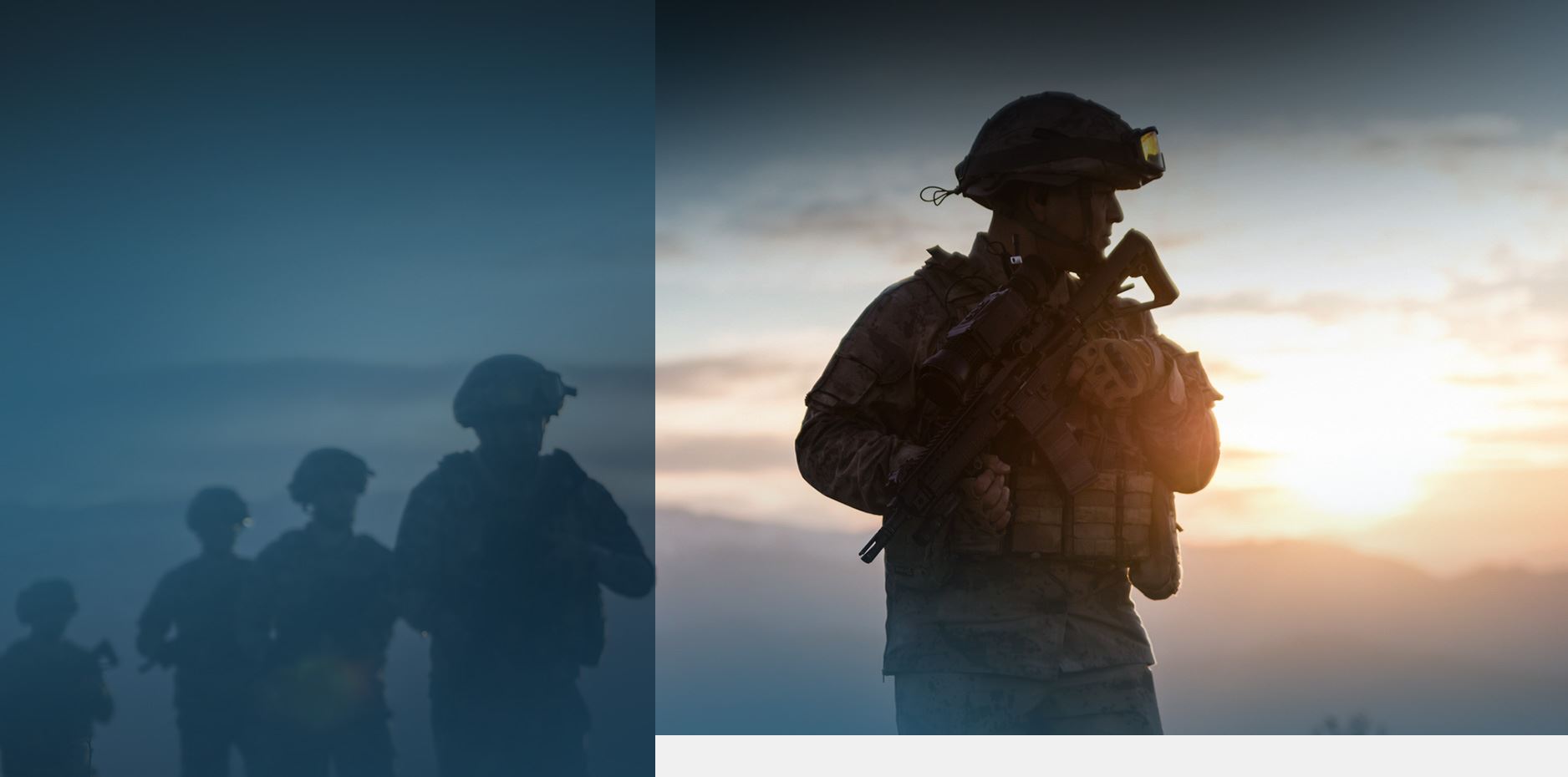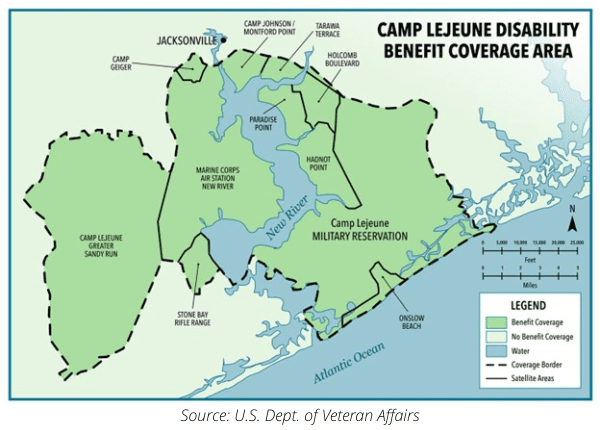
Camp Lejeune lawsuit
Latest News on Camp Lejeune Lawsuit | April 2024 Update
More than one million people working at U.S. Marine Corps Base Camp Lejeune, North Carolina between 1953 and 1987 were exposed to harmful contaminants in the water supply. The chemicals, including industrial solvents, benzene, volatile organic compounds, and others, are linked to cancer, kidney disease, Parkinson’s disease, and more.
If you were stationed or worked at Camp Lejeune, North Carolina for 30 or more days between 1953 and 1987 and developed health problems, you may be eligible to pursue compensation by joining the Camp Lejeune lawsuit. The Camp Lejeune Justice Act allows anyone sickened by exposure to contaminated water to file a lawsuit and seek to recover damages. The bill also streamlines disability claims and additional benefits for former military via the Veterans Administration.

“The brave men and women in our military take an oath to protect and serve. We as a nation pay that debt by promising to take care of them and their families. Without question, that promise was broken for over a million people at Camp Lejeune, who through no fault of their own ingested and bathed in water contaminated with a staggering amount of dangerous chemicals. It’s time for us as a nation to acknowledge this monumental failure and allow veterans, military family members, and support staff to obtain compensation for their suffering.” – Marine Corps. Veteran and Attorney Timothy A. Loranger
Join the Camp Lejeune Water Contamination Lawsuit. Contact Our Legal Team Today. Call (855) 948-5098 or Fill Out This Form.


Contact our experienced attorneys to learn about your legal options. Your consultation is free and confidential.
Where is Camp Lejeune?
The U.S. Marine Corps Base Camp Lejeune is a 246-square-mile military training facility in Jacksonville, North Carolina that includes 14 miles of beaches, making it ideal for amphibious assault training and combat readiness. Since the base was established in 1942, military personnel have trained to fight wars in the Pacific Islands, Korea, Vietnam, Kuwait, Iraq, and Afghanistan. Marines have also trained and deployed at Camp Lejeune for peacekeeping actions in Lebanon, tactical recovery of aircraft and personnel missions, drug interdiction missions, and numerous noncombatant evacuation operations.
Located near two deep-water ports at Wilmington and Morehead Bay, Camp Lejeune allows for fast deployments. The base and surrounding community is home to nearly 150,000 people, including active-duty military and their dependents, retirees, and civilian employees.
Who Qualifies for a Camp Lejeune Water Settlement?
To qualify for a Camp Lejeune water contamination settlement, the claimant must have been exposed to Camp Lejeune water for at least 30 days between August 1, 1953 and December 31, 1987. Next of kin can also bring a claim on behalf of someone who was exposed to toxic water at Camp Lejeune and fatal effects from the exposure.
Pursuant to the bill, any claimant will be required to prove that the illness or injuries they suffered were “as likely or not” caused by exposure to the water contamination at Camp Lejeune. Generally speaking, this will require expert witness testimony to explain how the toxic water caused or contributed to a covered illness or injury.
Some of the most common Camp Lejeune water contamination health issues include amyotrophic lateral sclerosis (ALS or Lou Gehrig’s disease), adult leukemia, aplastic anemia, birth defects, bladder cancer, breast cancer, cardiac defects, cervical cancer, dental issues, esophageal cancer, female infertility, heart disease, kidney cancer, liver cancer, lung cancer, lymphomas, myelodysplastic syndromes, multiple myeloma, neurobehavioral effects (including anxiety, depression, fatigue, memory loss, among others), non-Hodgkin’s lymphoma, pancreatic cancer, Parkinson’s disease, prostate cancer, rectal cancer, and scleroderma.
Other health issues may also be connected with exposure to toxic water at Camp Lejeune. Anyone who believes they may qualify for a settlement should speak with an experienced attorney as soon as they are able to preserve their legal rights.
What Caused Camp Lejeune Water Contamination?
This is how Marines, base workers, and their families were exposed to toxic water at Camp Lejeune:
- Camp Lejeune’s water supply comes from groundwater pumped from a freshwater aquifer underground.
- Starting in 1953, harmful chemicals, including fuel pollutants and cleaning solvents, made their way into the groundwater.
- Several wells pumped the toxic groundwater to a water treatment plant before the water went to storage tanks. The water treatment process did not remove all the groundwater contaminants.
- The storage tanks provided water to various areas of the base when needed.
For over 30 years, people who lived or worked at Camp Lejeune unknowingly drank or bathed in water containing perchloroethylene (PCE), trichloroethylene (TCE), dichloroethane (DCE), benzene, and dozens of other chemicals that can cause significant health harm. More than a million people who spent at least 30 days living or working at Camp Lejeune during the relevant time period are considered to have been exposed to toxic water.
Camp Lejeune Water Contamination Sites
Government reports indicate that Camp Lejeune had more than 600 water contamination sites throughout the sprawling base. The major water contamination sites at Camp Lejeune include:
ABC Cleaners: ABC Cleaners opened in 1953 and was a bustling business in the 1960s and 1970s, servicing Marines who needed their uniforms washed and pressed. North Carolina state records show that ABC Cleaners flushed chemical solvents that contained PCE through a floor drain into a septic tank, which disposed the contaminants into a drainage field on the property. Once in the soil, the chemicals entered the groundwater and contaminated two wells just 500 feet away. The wells serviced the Tarawa Terrace housing area of Camp Lejeune. Testing showed PCE concentrations in the soil underneath the ABC Cleaners site reached as high as 2,100 parts per million (ppm). The U.S. Environmental Protection Agency (EPA) placed ABC Cleaners as a hazardous waste site on the Superfund list in 1989. In 2005, the business owners sold ABC Cleaners. The new business, A-1 Cleaners, served as a clothing drop off location for another six years before all operations were terminated in 2011.
Hadnot Point Fuel Farm: The Hadnot Point Fuel Farm was built on the southeast corner of Holcomb Blvd and Ash Street sometime in 1941. According to government documents, the United States Marine Corps lost 1.1 million of gallons of fuel at a Hadnot Point fuel farm over the course of a 49-year operational history. This leaked fuel was found at all levels in the aquifer, and as a result, benzene entered the water supply at Camp Lejeune.
Well No. 651: Well HP-651 was constructed in 1971 along Piney Green Road in the Hadnot Point area near the Camp Lejeune base junkyard. When sampled in 1985, the well measured at:
- 18,900 ppb TCE
- 8,070 ppb DCE
- 655 ppb vinyl chloride
- 400 ppb PCE
The well was taken off-line in 1985.
Radio Shop South of Hadnot Point Industrial Area: Workers installing and repairing radio components disposed roughly 100 gallons of cleaning and degreasing chemicals per month into a wooded area near a cluster of water wells. According to a civilian worker from Camp Lejeune, there was “no guideline, policy, or program in place for base personnel handling or disposing of any chemical until the mid-1980s.” Until that time, “PCB-laden transformer oil was spread onto roads “to keep the dust down,” and everything else “was either dumped on the ground or they just dug a hole and poured the chemicals into the ground.”
Naval Hospital: The Camp Lejeune Naval Hospital used toxic water. In 1982, a sample taken from the emergency room sink at the Naval Hospital found TCE at 1,400 ppb.

Camp Lejeune Base Housing Areas Affected by Contaminated Water
If you served or lived at the Marine Base Camp Lejeune between 1953 and 1987 and lived in the following housing areas, you were exposed to water containing more than 70 harmful chemical contaminants, including benzene, PCE, DCE, TCE, and vinyl chloride.
- Berkeley Manor
- Hadnot Point
- Hospital Point
- Midway Park
- Paradise Point
- Tarawa Terrace
- Watkins Village
Chemicals in Water at Camp Lejeune Marine Base
The main chemicals found in the water at Camp Lejeune are benzene, perchloroethylene (PCE), and trichloroethylene (TCE).
Benzene is a colorless chemical with a sweet odor that forms from both natural processes and from human activities. Long-term benzene exposure has been shown to effect bone marrow and can cause anemia and leukemia. The U.S. Department for Health and Human Services (HHS) determined that benzene causes cancer in humans.
Trichloroethylene (TCE) is a colorless liquid used as a solvent for cleaning metal parts. A meta-analysis of seven cohort studies (Wartenberg et al. 2000) found that occupational exposure to TCE was associated with excess incidences of:
- Liver cancer
- Kidney cancer
- Non-Hodgkin's lymphoma
- Prostate cancer
- Multiple myeloma
The U.S. EPA has determined that TCE is carcinogenic to humans by all routes of exposure.
Perchloroethylene (PCE) is a human-manufactured chemical used for dry cleaning and metal degreasing. The U.S. EPA classifies PCE as a likely human carcinogen.
Camp Lejeune Water Exposure Health Issues
The following health issues have been associated with Camp Lejeune toxic water exposure:
- Adult leukemia
- Anaplastic anemia
- Bladder cancer
- Breast cancer
- Esophageal cancer
- Female infertility
- Hepatic steatosis
- Kidney cancer
- Liver cancer
- Lung cancer
- Miscarriage (exposure during pregnancy)
- Multiple myeloma
- Myelodysplastic syndromes
- Neurobehavioral effects
- Non-Hodgkin lymphoma (NHL)
- Parkinson’s Disease
- Renal toxicity
- Scleroderma
What are Neurobehavioral Effects?
Several studies have indicated that toxic chemicals in the water at Camp Lejeune may cause neurobehavioral effects, which include Parkinson’s Disease, memory loss, anxiety, dementia, concentration problems, post-traumatic stress disorder, insomnia, fatigue, motor problems, and others.
Camp Lejeune ATSDR Studies
The U.S. Agency for Toxic Substances and Disease Registry (ATSDR) conducted several studies looking into the effects that toxic water exposure had on people living and working at Camp Lejeune, North Carolina. In one study, ATSDR looked at male breast cancer rates. The agency found possible associations between exposure to PCE, DCE, and vinyl chloride at Camp Lejeune and male breast cancer.
Another ATSDR study looked at birth defects among children between 1968 and 1985. The mothers who gave birth to the children in the study resided on the base at the time of delivery. According to the study:
- In utero exposure to PCE was associated with preterm birth.
- In utero exposure to TCE was associated with small for gestational age (SGA), reduced mean birth weight (MBW), and term low birth weight (TLBW).
- In utero exposure to benzene was associated with TLBW.
ATSDR also completed a study that analyzed whether exposures to Camp Lejeune water were associated with increased risk of death from specific cancers and other chronic diseases among civilian workers employed at the base. Compared to base workers from the Marine Base at Camp Pendleton in California, Camp Lejeune workers had higher mortality rates for the following causes of death:
- Female breast cancer
- Kidney cancer
- Kidney diseases
- Leukemias
- Lung cancer
- Multiple myeloma
- Oral cavity cancer
- Parkinson’s disease
- Prostate cancer
- Rectal cancer
Per the study, the higher rates of kidney cancer, prostate cancer, rectal cancer, leukemias, and Parkinson’s disease were primarily among the Camp Lejeune civilian workers with higher cumulative exposures to the contaminants.
LATEST NEWS ON CAMP LEJEUNE LAWSUIT
April 4, 2024: Camp Lejeune attorneys estimate that over 1,660 claims are filed under the Camp Lejeune Justice Act, along with approximately 176,662 administrative claims filed with the U.S. Navy.
The government has two different entities that are offering Camp Lejeune settlements: The Torts Branch and the Department of Justice.
The Torts Branch identified 51 cases that qualify for the Elective Option. Of these cases, 21 settlement offers have been accepted ranging from $100,000 to $450,000. Below we break down the 21 Torts Branch Camp Lejeune settlements that have been accepted thus far:
Bladder Cancer: 5 cases with settlements ranging from $150,000 - $450,000
Kidney Cancer: 5 cases with settlements ranging from $150,000 - $300,000
Kidney Disease: 4 cases with settlements ranging from $100,000 - $250,000
Non-Hodgkin’s Lymphoma: 3 cases with settlements ranging from $150,000 - $300,000
Parkinson’s Disease: 2 cases with settlements ranging from $100,000 - $400,000
Leukemia: 1 case with settlement of $300,000
Multiple Myeloma: 1 case with settlement of $250,000
Outside of the Torts Branch, the U.S. Department of Justice approved settlements for 59 individuals who filed claims through the Navy. Of those, 24 have accepted settlement offers. Below we break down the 24 DOJ Camp Lejeune settlements that have been accepted thus far:
Bladder Cancer: 6 cases with settlements ranging from $150,000 - $450,000
Kidney Cancer: 5 cases with settlements ranging from $150,000 - $300,000
Leukemia: 4 cases with settlements ranging from $150,000 - $300,000
Non-Hodgkin’s Lymphoma: 3 cases with settlements ranging from $150,000 - $300,000
Kidney Disease: 3 cases with settlements ranging from $100,000 - $250,000
Parkinson’s Disease: 3 cases with settlements ranging from $250,000 - $400,000
Multiple Myeloma: 1 case with settlement of $250,000
Because there are over 175,000 Camp Lejeune claims and only a few dozen have been settled, more needs to be done to expedite this process and get victims the justice and compensation they deserve.
February 1, 2024: The court has issued an order outlining the procedures and timelines for the Track 1 Discovery Pool cases. These include:
- Bladder cancer
- Kidney cancer
- Leukemia
- Non-Hodgkin’s lymphoma
- Parkinson’s disease
Here is a summary of the upcoming process:
- Discovery Phase: Plaintiffs will have 45 days to provide detailed information about their claim. Both parties will have 135 days to share all relevant facts and evidence. Following this, there will be deadlines for disclosing expert witnesses.
- Motions Before Trial: After the exchange of expert witness information, there will be a 30-day period for filing any motions that could potentially resolve cases without trial.
- Settlement or Trial: The court will discuss settlement possibilities through Alternative Dispute Resolution (ADR) and identify cases to potentially be tried as example cases this year.
- Trial Details: Judges overseeing the Camp Lejeune lawsuits will handle the specifics for the cases they oversee. Their decisions regarding discovery, trial procedures, or other issues will supersede the order.
Camp Lejeune Lawyer for Contaminated Water Claim
If you or someone in your family lived or worked at Camp Lejeune for 30 days or more between 1953 and 1987 and were diagnosed with bladder cancer, kidney cancer, liver cancer, leukemia, multiple myeloma, non-Hodgkin’s lymphoma, or Parkinson’s disease, you may be able to pursue Camp Lejeune settlement compensation. The first step in the process is retaining experienced legal representation to prepare a lawsuit on your behalf. We can help you.
The national law firm of Wisner Baum works with the top Camp Lejeune water contamination lawyers to pursue justice for American families suffering as a result of exposure to toxic chemicals.
To learn more about your legal rights, give us a call at (855) 948-5098 or fill out our case evaluation form.

.2411011325574.jpg)

